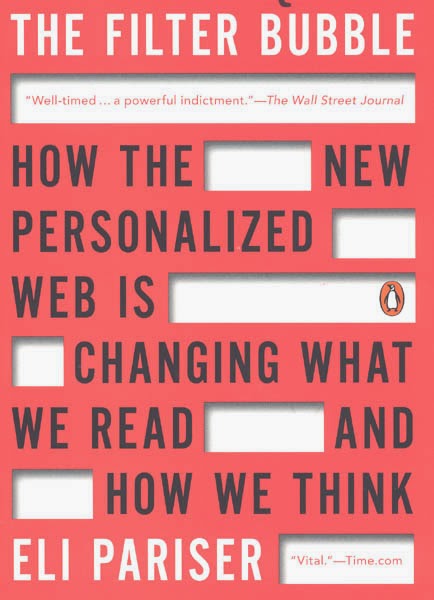"Our
technological powers increase, but the side effects and potential
hazards also escalate." -- Alvin Toffler
Recent,
and rather scary, reads came from Char.
I
started with Dragnet Nation: a Quest for Privacy, Security, and
Freedom in a World of Relentless Surveillance, by Julia Angwin.
From cameras in public places, to every keystroke on a computer being
monitored, to drones flying over the backyard, pretty much nothing is
private anymore. It's amazing how much information is gathered, and
how complicated it is to find out where and if there is a way to get
off that list. Well written and easy to read, the author takes us
along on her efforts to reduce the amount of information that is
available about her.
Much
of the information gathered and stored can be used to track us ...
what we buy, eat, what sites we visit (and how often), political
leanings, travel, and so on. That information is then used to
customize what we might see in an internet search, what ads appear on
the sides of our screens, leading to a personal and rather telescopic
view of the news stories we see, the charities we might be interested
in supporting, that sort of thing. Eli Pariser, the author of The
Filter Bubble: How The New Personalized Web is Changing What We Read
and How We Think, believes this reduces our awareness of what is
going on around us, eliminates the stories that might shock us, cause
us to rethink something, or even try a new book or movie.
Identity
Theft Alert: 10 Rules You Must Follow to Protect Yourself From
American's #1 Crime, by Steve Weisman is, as the title tells us,
about identity theft. It explains how it is done and then ways to
protect yourself. It made me much more aware of things I would not
have considered a risk before, such as a photocopy machine. These
now have memory chips, which makes all the scans accessible even long
after something has been photocopied.
These
books brought to mind Silent Spring, by Rachel Carson. It too,
was a warning, an environmental warning. She made us aware of what
the chemicals in synthetic pesticides (mostly DDT at the time) were
doing, most especially to birds. (Hence the title, 'silent' spring).
It was a long, hard battle with the chemical companies and it became
the inspiration for the first grassroots movement that led to the
creation of the U. S. Environmental Protection Agency.
It
has been longer than I care to acknowledge since I read 1984
(George Orwell) and Brave New World (Aldous Huxley) but I
remember two things: Big Brother is Watching You, and, how everyone
was electronically connected by headsets and big screens. We don't
need the big screens (although they are certainly available) but it
is possible to be connected and in front of a screen at any and all
times. The authors weren't far off the mark.
Reading
Hermit With Dog

No comments:
Post a Comment